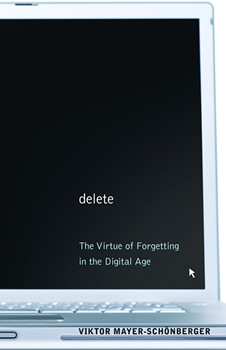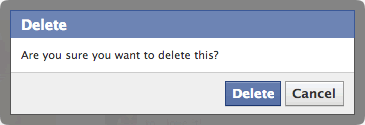Delete: the book
 Earlier this year I read Delete: The Virtue of Forgetting in the Digital Age by Viktor Mayer-Schönberger. It was a rather dry academic read, but one with insightful content. It discusses how the digital world can remember too well some things which are better forgotten and the real unintended harmful consequences of photos and comments being dug up later out of context.
Earlier this year I read Delete: The Virtue of Forgetting in the Digital Age by Viktor Mayer-Schönberger. It was a rather dry academic read, but one with insightful content. It discusses how the digital world can remember too well some things which are better forgotten and the real unintended harmful consequences of photos and comments being dug up later out of context.
Unlike other books I’ve enjoyed lately on memory, such as Joshua Foer’s Moonwalking with Einstein: The Art and Science of Remembering Everything, Delete gives a human history on the importance of naturally forgetting things over time.
Mayer-Schönberger proposes that digital content should have an expiry date when created, forcing us to think for just a short moment about how long the information should be available. I’ve been pondering this alternative perspective after reading the book since there’s so much focus in the digital world on archiving, searching, and permanence.
Exploring using Facebook in an ephemeral way
As a result, I’ve recently been exploring using Facebook in an ephemeral way only. I’ve been deleting content I add after a few weeks. Going back and deleting old content (if indeed it truly is deleted) is not easily done. I’ve copied and pasted any important or time-marker status updates which I wanted to remember for our family yearbook. I could have exported all my Facebook content again for archiving if I really wanted, but didn’t see the need.
I’ve realised that when I consider my content on Facebook, there’s very little I need to keep. I already have an archive of my photos (see how I manage my photos) and the comments from friends and family on old photos have already been enjoyed in that moment. They don’t need to be kept forever.
What changes when I delete old content?
 I’m not leaving a big pile of my history in someone else’s control. This week Facebook added its “us” feature which creates a Facebook timeline for couples. Feedback to the change (as usual) is largely negative: people feel like they being exploited, their privacy eroded and once again feel there’s a “creepy” aspect.
I’m not leaving a big pile of my history in someone else’s control. This week Facebook added its “us” feature which creates a Facebook timeline for couples. Feedback to the change (as usual) is largely negative: people feel like they being exploited, their privacy eroded and once again feel there’s a “creepy” aspect.
I see it differently: Facebook is merely data-mining its digital archives and packaging them up in new ways it sees fit. By using Facebook in an ephemeral way, I’m avoiding those issues. I’m still benefitting from the few remaining benefits I see of Facebook, rather than quitting the site altogether.
Earlier this year I wrote of the difference between asking and sharing. By deleting old content, status updates and photos become a little more like physical world interactions: they’re there for a moment and then gone into the memories of those who saw or heard them. Those memories fade over time unless they’re talked about or seen again. They become more interesting while they’re there, because soon they’ll be gone and you could miss out knowing or seeing something.
There’s other benefits in it for me too. I also can stop myself going back and re-reading things that I should be forgetting: that status update where I was sick and no-one commented, or my favorite photo no-one commented on. I feel less tied to a social network if I wish to leave it one day if I have less baggage stored there. I don’t have anything to hide by deleting old content, but I don’t need it kept either.
I don’t expect Facebook or other social media to introduce expiry dates for content, and don’t think that thinking about deleting old content will become trendy any time soon, but there are good reasons to think about it.
For more, see:
This talk about the book by Viktor Mayer-Schönberger:
The Guardian’s review of Delete.
Addendum
Man sues Google over his past affecting his current reputation and wins (court ruling here)
Get actionable tips to grow your website
Thoughtful weekly insights (no hype!) on improving your website